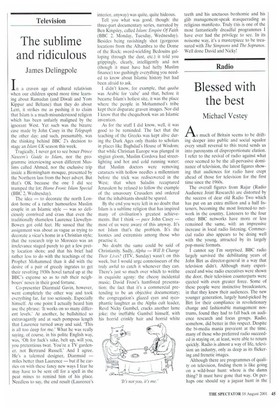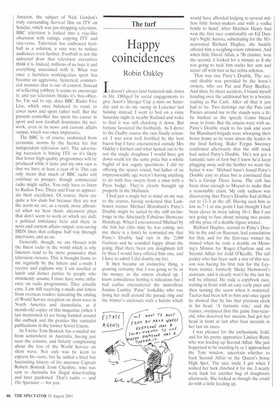Blessed with the best
Michael Vestey
As much of Britain seems to be drifting deeper into public and social squalor every small reversal to this trend sends us into paroxysms of disproportionate elation. I refer to the revival of radio against what once seemed to be the all-pervasive dominance of television, the latest figures showing that audiences for radio have crept ahead of those for television for the first time since the 1960s.
The overall figures from Rajar (Radio Audience Joint Research) are distorted by the success of dear old Radio Two which has put on an extra million and a half listeners, becoming the most listened-to network in the country. Listeners to the four other BBC networks have more or less remained the same, with an impressive increase in local radio listening. Commercial radio also appears to be doing well with the young, attracted by its largely pop-music formats.
I cannot say I'm surprised. BBC radio largely survived the debilitating years of John Birt as director-general in a way that television didn't. Although many experienced and wise radio executives were shown the door, their television counterparts were ejected with even greater force. Some of these people were instinctive broadcasters, in that they knew their audiences. The new younger generation, largely hand-picked by Birt for their compliance in revolutionary change and fashionable management nostrums, found they had to fall back on audience research and focus groups. Radio, somehow, did better in this respect. Despite the hi-media mania prevalent at the time, many of those who preferred radio succeeded in staying or, at least, were able to return quickly. Radio is almost a way of life, television an industry, only as deep as its flickering and frenetic images.
Although there are programmes of quality on television, finding them is like going on a wild-boar hunt: where is the damn thing? It must have gone that way. Or perhaps one should say a jaguar hunt in the
Amazon, the subject of Nick Gordon's truly outstanding Survival film on ITV on Sunday, which was jaw-dropping television. BBC television is locked into a vice-like obsession with ratings, copying ITV and vice-versa. Television has embraced football as a solution, a sure way to reduce audiences even further. Football is not the universal draw that television executives think it is. Indeed, millions of us hate it and everything associated with it. What was once a harmless working-class sport has become an aggressive, hysterical, commercial monster that is out of control. Instead of reflecting yobbery it seems to encourage it: and yet television thinks it's box-office. So, I'm sad to say, does BBC Radio Five Live, which once balanced its remit to cover news and sport rather well. But the present controller has spent his career in sport and now football dominates the network, even in its news and current affairs output, which was once impressive.
The BBC is, of course, cushioned from economic storms by the licence fee but independent television isn't. The advertising recession is hitting ITV so it's likely that fewer high-quality programmes will be produced while it lasts; and my own view is that we have at least a year of it. This can only mean that much of BBC radio will continue to prosper, though commercial radio might suffer. You only have to listen to Radios Two, Three and Four to appreciate their excellence. Of course, there are quite a few duds but because they are not the norm we are, as a result, more affronted when we hear them: afternoon plays that don't seem to work or which are dull; a political imbalance here and there in news and current affairs output; cost-saving ISDN lines that collapse half way through interviews, and so on.
Generally, though, we are blessed with the finest radio in the world which is why listeners tend to be more possessive than television viewers. This is brought home to me regularly by the letters and e-mails I receive and explains why I am assailed at lunch and dinner parties by people who mistakenly assume I must have some influence on radio programmes. They actually care. I am still receiving e-mails and letters from overseas readers lamenting the ending of World Service reception on short wave in North America and Australasia, as if month-old copies of this magazine (when I last mentioned it) are being handed around the outback and the prairies like samizdat publications in the former Soviet Union.
As I write Tom Bostock has e-mailed me from somewhere in Australia, having just seen the column, and bitterly complaining about the loss of the World Service on short wave. Not only was he keen to express his views, but he added a brief but fascinating history of his ancestor Captain Robert Bostock from Cheshire, who was sent to Australia for illegal slave-trading and later pardoned. That's radio — and The Spectator — for you.



























































 Previous page
Previous page